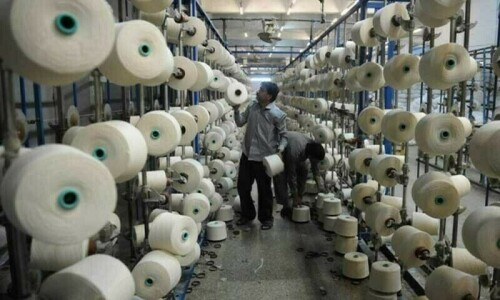PARIS, April 4: Aid to the developing countries fell last year and most donors are falling behind on their stated commitments to increase the amount of money they give, the OECD said in a report on Friday.
“Overall, most donors are not on track to meet their stated commitments to scale up aid and will need to make unprecedented increases to meet the targets they have set for 2010,” it said in a statement.
Additionally, based on a survey of donors’ future spending plans to 2010 the date set by the Group of Eight Gleneagles and UN Millennium accords there is a considerable shortfall looming, it said.
“Efforts to increase aid are being factored into some donors’ forward plans but it still leaves about $34 billion in 2004... to be programmed into donor budgets if the commitments made in 2005 to substantially increase aid by 2010 are to be fully met.”
Reacting to the report, rock star and anti-poverty militant Bono said that while “solutions (to world poverty) are not simple and of course not just about cash, or aid levels, ... it does make things more complicated when funds are promised and not delivered.”
Oliver Buston, head of DATA in Europe, an advocacy group mobilising against extreme poverty and AIDS in Africa, appealed to France in particular. “France, as European Union president in the second half of this year, must set an example by boosting its aid budget. It cannot lead Europe with empty hands.”
For 2007, the 22 member countries of the OECD Development Assistance Committee, the world’s major donors, provided $103.7 billion, down 8.4 per cent as large debt relief programmes for Iraq and Nigeria ended.
This Official Development Assistance (ODA) was equivalent to 0.28 per cent of the members’ combined gross national income, down from 0.31 per cent in 2006, the OECD said in a statement.
The United Nations has a target of 0.70 per cent of GNI for aid flows.
Excluding debt relief grants, net ODA was up 2.4 per cent.
OECD secretary general Angel Gurria said on Friday that despite concerns about the current global market and economic turmoil, donors must stick to the task given the security and other risks due to poverty.
“In the current global economic context, we must keep our attention actively focused on development assistance to the poorest,” Gurria said in Tokyo.
For 2007, the biggest donors were the United States, Germany, France, Britain and Japan while the only countries to exceed the UN 0.7 per cent of GNI target were Denmark, Luxembourg, the Netherlands, Norway and Sweden.
The United States’ net ODA last year fell 9.9 per cent to $21.8 billion with its GNI ratio at 0.16 per cent, while Japan gave $7.7 billion or 0.17 per cent.
The combined ODA of the fifteen members of the DAC that are also EU members fell 5.8 per cent to $62.1 billion or 0.40 per cent of their combined GNI.
Commenting on the report, British charity Oxfam said the figures showed that rich countries were falling down on promises to the developing world.
—AFP













































Dear visitor, the comments section is undergoing an overhaul and will return soon.